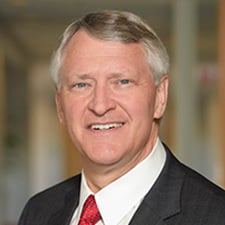In what could be the understatement of the century, David O. Barbe, MD, MHA, began the valedictory address that closed out his term as president of the World Medical Association (WMA) by noting that “it has been one of the most unusual and challenging years our profession has ever faced.”
As the AMA’s 2017–2018 president, Dr. Barbe presided over a term marked by efforts to repeal and replace the Affordable Care Act and the growing recognition that firearm violence is a public health crisis in the United States.
As president of the WMA, whose members include 115 national medical associations representing 9 million physicians around the world, Dr. Barbe—a family physician from Mountain Grove, Missouri—led an international organization during a year marked by a global pandemic and all its facets.
“COVID-19 isn’t just one thing, it’s not ‘Let’s go get PPE [personal protection equipment] for everybody, it’s not even ‘OK, let’s go get vaccines for everybody,’” Dr. Barbe said in an interview.
“It's the downstream effect of that, the health impact on physicians and other health care workers, on their morale and—quite honestly—on their numbers,” he added. “We have had a lot of health care workers and physicians that either have died or have been disabled or were out of work for some more significant period of time—not just a 10-day period of isolation—and that has just had just taken quite a toll on patient care.”
On top of that, Dr. Barbe added, has been the uneven global distribution of COVID-19 vaccines, the spread of misinformation, the harassment of physicians and other health care workers and public health officials in the U.S., and the imprisonment of physicians in countries such as Myanmar and Nicaragua for criticizing their governments’ responses to the pandemic.
Vital support for doctors worldwide
Standing up for physicians facing government oppression, such as doctors in Myanmar whose plight was recently documented in a BMJ report, was among the most satisfying aspects of his term as WMA president, Dr. Barbe said. The WMA—based in Ferney-Voltaire, France—also took stands against racism and gender discrimination in medicine.
“We updated a policy document regarding discrimination against women in the medical profession and women's health care,” said Dr. Barbe, also a former president of the Missouri State Medical Association. “Around the world, in many countries, the quality of health services provided to women and girls is just not what it needs to be.”
The WMA also adopted policy opposing travel bans that discriminate against people who are vaccinated, but not with one of the “big four” vaccines made by Pfizer-BioNTech, Moderna, Johnson & Johnson or AstraZeneca.
“We really believe that that is further discriminating against some of those countries that desperately need to be reintegrated into the world market, if you will, for trade, for education and for science,” Dr. Barbe said.
Doctor burnout a global problem
During his term, Dr. Barbe was a strong advocate of professionalism and ethics and worked to revise the WMA International Code of Medical Ethics.
“The public, as well as physicians, understand that physicians conducting themselves in the most highly professional and ethical way is critical for stable health care,” he said.
During his term as WMA president, Dr. Barbe was surprised to learn how physicians in other countries around the world face many of the same challenges, such as struggling with burnout.
“I thought these countries are going to have unique problems,” Dr. Barbe said. “They're going to be totally different, and I'm not sure I'm going to even understand them. I understand them—they're the same ones that we face.”
After leading state, national and international organizations, Dr. Barbe said he is stepping aside and volunteering to serve as a mentor to the new generation of physician leaders, including those with and without formal leadership posts.
“Leadership is not always about the title,” Dr. Barbe said. “It's not always about being the chair or the president or whatever. It's about having a positive influence in your part of the organization—or the world.”




